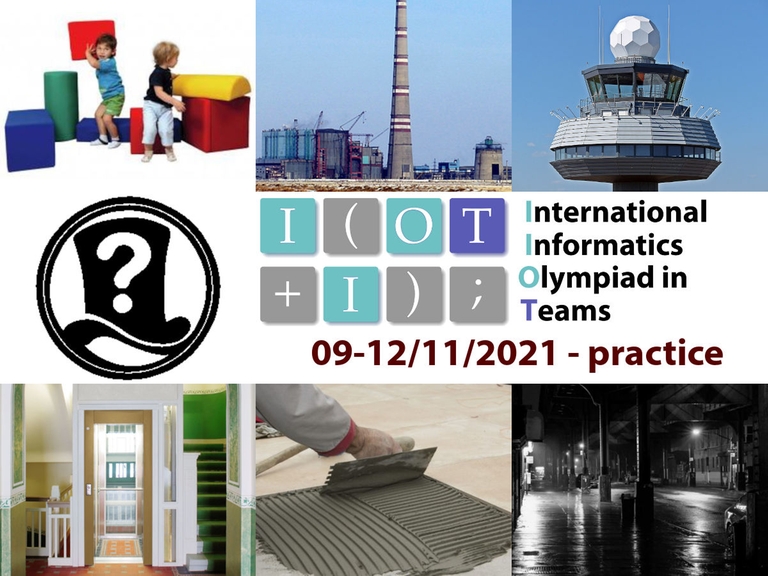For the fifth time, the International Informatics Olympiads in Teams will be mirrored into online contests. These contests, of a lower difficulty level than those of the IOI, are intended for teams of 4 contestants from the same high school. However, everyone is welcome to participate to the mirror contests, especially if you are considering to join officially the IIOT in the future!

More specifically, we allow:
- several teams from the same school (also in the official contest)
- teams participating only in some contests (also in the official contest)
- smaller teams (also in the official contest) and larger teams
- teams of students from different schools and non-students
- changes in team members between contests
The mirror contests timing will be USACO-like: it will be open for 27 hours but you will be able to compete for up to 3 hours (you can decide when to "start" your time window, after the login). Participation will be available upon registration (re-registration needed for each contest). The problem statements will be available in English only, and the languages officially supported are C, C++, Pascal and Python 3. Every contest will consist of 8 or 9 problems (see https://squadre.olinfo.it and https://iio.team for further information).
Note: you can decide when to start your 3 hour time window, but remember that the contest will end 27 hours after the start of the official contest regardless of your time window!
If you want to participate, you must:
- Visit the contest website: https://mirror.squadre.olinfo.it/
- Click the link "register", fill out the form and then click on the register button and then "back to login"
- You can now log in with the same username and password you used to sign up
- If the login is successful you will be ready to participate, just wait for the contest to start! (and maybe save the page in your bookmarks, so that you can quickly get back to it when the contest begins)
- When the contest starts, you will see a red button. Click it when you want to start your 3 hour time window!
- The ranking for each contest will be available at https://mirror.squadre.olinfo.it/ranking/ after the start of each contest
- The tasks will also be available for training in https://training.olinfo.it few days after the contests
- Good luck and have fun!
The schedule of the contests is the following (starting times in the CET time zone):
- Practice: nov. 9 to nov. 12
- Round 1: nov. 15 @ 17:30
- Round 2: dec. 14 @ 17:30
- Round 3: jan. 12 @ 17:30
- Round 4: feb. 3 @ 17:30
- Finals: feb. 25 @ 13:00
We hope that you will join us or encourage your students to do so!
Giorgio Audrito (on behalf of the Italian IIOT organizers)











Hello! Exactly what do you mean by "A team can include no more than one awarded contestant of the National Individual Olympiad in Informatics in the previous year." ? In my country, the national Olympiad is used to choose 10 students for the "CIIC" (Ibero-American informatic competition)
This only applies to the official contest (not to the mirror); and every officially participating country declines this principle differently depending on the way their national selection process works!
Thanks for your answer, is there still time to officially register as a country?
the languages allowed are C, C++, Pascal and Python 3sad java noises"Team can include no more than one awarded contestant of the National Individual Olympiad in Informatics in the previous year"
What is the reasoning behind this rule?
In my opinion, the skill level difference between the awarded and non-awarded contestants is usually quite high. In fact, it can be so high, that the awarded person can end up being by far the strongest member of the team and doing most of the (heavy) work during the contest. This rule will thus lead to a lot of imbalanced teams, where the teams' performance will mostly depend only on the strongest member's level.
It is indeed a drawback of this rule that sometime happens. However, a team with a single strong contestant solving every problem and not valorising the other three team members, will often have a hard time against a team of four middle-level contestants, by the fact that 8-9 problems are quite a lot to code in 3 hours just by yourself. The purpose of this rule is actually twofold: (1) encouraging teams without a top-level contestant to try to compete anyway, and have a chance of getting good results; (2) by splitting the top-level contestants across several teams, encourage each of them to tutor their team members, sharing their problem solving skills and rising the overall level of the contestants
Will the practice round have problems from previous years, and will it also be three hours long?
Yes and yes!